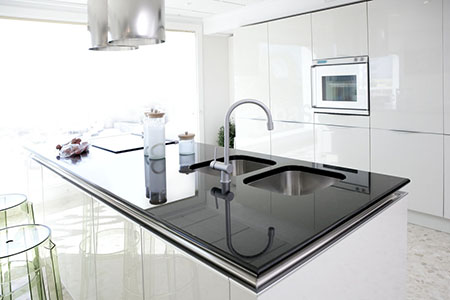3 Reasons Why Quartz Kitchen Countertops Are Simply Better
 Over the past couple of decades, a natural stone trend has been sweeping kitchens everywhere. In every new kitchen, one would find clean, sleek marble countertops. As homeowners updated their older kitchens, they would choose granite countertops in a wide array of colours and patterns. Natural stone became the standard for high-end, newly-remodelled kitchens.
Over the past couple of decades, a natural stone trend has been sweeping kitchens everywhere. In every new kitchen, one would find clean, sleek marble countertops. As homeowners updated their older kitchens, they would choose granite countertops in a wide array of colours and patterns. Natural stone became the standard for high-end, newly-remodelled kitchens.
As time has moved on, kitchen design has started to shift in a new direction in regard to countertops: quartz. This manmade material is taking kitchens by storm due to its durability, style, and cost-effectiveness. Here are just a few reasons why someone who is building a home or remodelling a kitchen should consider quartz countertops over their natural stone counterparts.
1. Price
To be clear, quartz isn’t an inexpensive countertop material. In years past, granite was often less expensive than quartz. Times have changed, however, and now only low-end granite costs less than quartz. Higher-end granite or marble will send your countertop price skyrocketing well past that of quartz.
2. Selection
Will your new kitchen be traditional or modern? Dark or light? Large or small? No matter what sort of kitchen you have in mind, you’ll be able to find the perfect quartz to build it out. Because it’s manmade, quartz is available in a much wider variety of colours and styles than natural stone countertops. Quartz isn’t just for your countertops, either. Choose quartz tile and design a beautiful backsplash to accent your kitchen wall.
3. Durability
One of the biggest reasons people choose quartz over natural stone is because of its durability. Simply put, quartz is practically an install-it-and-forget-it countertop application. It doesn’t need to be sealed, unlike natural stone, which needs to be continually resealed to prevent damage. Because quartz is nonporous, stains aren’t a concern. Coffee, wine, dark-coloured spices, and ingredients like tomato sauce simply wipe right off without leaving so much as a blemish. Etching is also not a concern, so you won’t have to worry about dripping lemon juice or vinegar on quartz countertops. The only real concern with quartz is heat. Because the surface is not heat-resistant, you’ll need to protect your countertop with a pad or trivet before placing hot pans upon it.
Cleaning quartz is a snap. For everyday cleaning, simply use a sponge with hot water and a dab of dish soap. For more extensive cleaning, a gentle cleanser will do the job. Avoid using abrasive pads such as steel wool. You’ll also want to avoid using extremely harsh or abrasive chemicals. Quartz countertops really are the wave of the future. When compared to natural stone, they’re less expensive. More important over the long-run—they also save time. Because they’re so easy to clean and have no necessary maintenance, quartz countertops free you up to enjoy other things. If you’re planning for an upcoming building or remodelling project, consider quartz. When it comes to budget and day-to-day living, it’s simply the best choice.
- What to Consider when Buying Quartz Countertops
- Maintenance Tips for Quartz Countertops
- Is Quartz a Safe Material for Countertops?
- How To Get The Best Price On Quartz Countertops
- Estimating the Cost of Quartz Countertops
- Choosing Quartz Countertop Color
- Blue Quartz Countertops: What You Need To Know
- All You Need To Know About Quartz Tile Countertop
- Advantages of Installing Countertops Made Of Quartz
- How to Choose a Quartz Countertop
- Why Quartz Kitchen Countertops Are the New Trend
- Care and Cleaning of Your Quartz Countertops
- Are Quartz Countertops Right for Your Kitchen?
- 3 Reasons Why Quartz Kitchen Countertops Are Simply Better
- Why the Best Kitchen Countertops Are Made of Quartz
- Kitchen Countertops: Why Quartz Beats Granite Every Time
- Granite vs Quartz Countertops: Which Material is Best?
- Easy and Beautiful: Care and Maintenance of Your New Quartz Countertops

